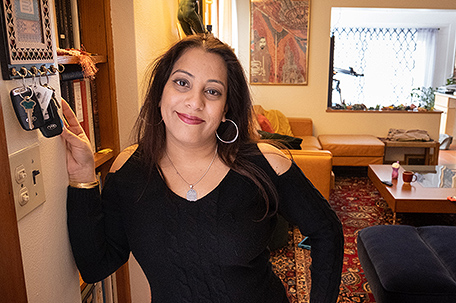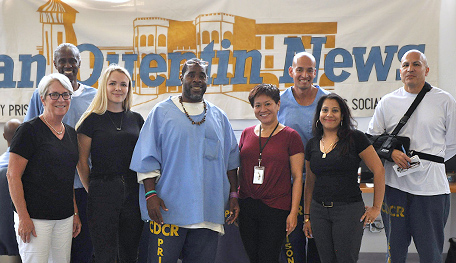
ABOVE PHOTO: Penn State Donald P. Bellisario College of Communications journalism department assistant teaching professor Shaheen Pasha in her home in State College, Pa on Saturday February 27, 2021. (Photo by Will Yurman)
By Melissa Manno
When veteran journalist and professor Shaheen Pasha talks to her best friend over the phone, life almost feels normal. Time goes by swiftly as they share stories and listen to each other’s voice, narrating life since they last spoke.
But it’s still a shock to Pasha when the line is disrupted with a 60-second warning from an operator and the conversation, along with her false sense of normalcy, is brought to a rushed end.
These weekly Tariq MaQbool conversations have been going on for more than 18 years now, but not in her wildest imagination could Pasha have predicted that the first call – about MaQbool, but not from him – would change her life and career forever.
It was the end of her shift at the Jersey City, New Jersey office of Dow Jones, where she worked as a stock market reporter. Pasha had just wrapped up writing her column when she received a phone call: MaQbool had been arrested for murder. He would end up being sentenced to 150 years in prison without parole.
It was MaQbool’s younger brother, Adeel, who told her that MaQbool was found guilty – one of three men convicted of murdering two men found in a burning SUV in Jersey City in 2002.
Pasha, who is now 43, describes that call as being like a nuclear bomb, changing everything with its wrath.
“Until you actually become part of that world where someone you love is incarcerated, you don’t know what that means,” Pasha said. “That day never leaves you.”
Although living in two different worlds, Pasha’s friendship with MaQbool remained strong through the years. They talked often. He shared stories of life behind bars, from the cafeteria menus to conversations with new inmates.
When she finally went to visit him at the New Jersey State Prison in Trenton four years later, she saw the lonely reality of his newfound life.
“The psychological damage it does to not have any sort of outlet or form of expression haunted me,” Pasha said. “I felt helpless, like there was nothing I could do but watch someone I care about wither away inside.”
Life goes on
For the next two decades, following that initial call, Pasha’s career as a journalist flourished and so too did her personal life, as she became a wife and mother of three.
But she continued to look back on that 2002 phone call – and she has taken the pain of that grim news and redirected it into advocacy.
In 2020, Pasha and Yukari Kane, a veteran journalist and adjunct lecturer at Northwestern University, launched the Prison Journalism Project, a nonprofit initiative designed to equip prison inmates with journalism skills and provide a platform to tell their stories.
As part of the project, they launched a website last April that has now published almost 300 stories from 140 prison inmates across 27 states.
The stories deal with everything from the worsening COVID-19 situation to how incarcerated individuals celebrate holidays. But they all share one thing: the ability to bring readers inside prison walls to get a glimpse of the inmates’ reality.
One of the project’s contributing writers, Steve Brooks, was recently honored for commentary by the Society of Professional Journalists Northern California for his commentary titled “The Hidden Heroes Forgotten Inside” (https://prisonjournalismproject.org/pjp-stories/hidden-heroes-forgotten-inside) about criminal justice in the state.
When Brooks was 22, he was arrested for a series of violent home break-ins and sentenced to life in prison at San Quentin State Prison. Now, at 48, Brooks is a contributing writer for the San Quentin News and the Prison Journalism Project.
“Steve was one of our first guys and wrote those pieces for us when we were just starting out and didn’t even have a website set up,” Pasha said. “It was a huge deal for us because it was the first time we were acknowledged as a newsroom. I’m so proud of the project but more than that, I’m so proud of Steve because he deserves it.”
Besides offering a creative outlet for people like Brooks, the Prison Journalism Project allows Pasha to use her passion for journalism to encourage change in the criminal justice system.
Always a journalist
While other little girls pretended their hairbrushes were microphones and dreamed of becoming pop stars, Shaheen Pasha stood in front of her mirror reporting live from Moscow. She didn’t actually know where Moscow was, just that it sounded important and seemed like a good place for a journalist — which, at age 5, Pasha decided she would one day be.
This aspiration was heightened during her youth, growing up the daughter of Pakistani immigrants and deeply poor in what she describes as a “rough area” of Brooklyn.
“A lot of my classmates were going to juvey or getting pregnant, and I just remember thinking, ‘This isn’t the world I see on TV. There’s so much more out there,’”said Pasha. “I wanted to escape it — to see the world and bring those stories I saw back to my neighborhood because I felt like it made the world bigger.”
Her parents came to New York from Pakistan in 1976, the year before she was born, inspired by her father’s ambition and her mother’s career as a medical tech that allowed her to get a work visa.
Pasha spent much of her early childhood living in Borough Park, Brooklyn, where her family felt the reality of poverty and once escaped homelessness with the help of a generous neighbor opening her home.
At 11, Pasha moved to Brooklyn’s East New York, which she described as being “very poor and full of crime.”
Pasha said her family found community in the close-knit, yet widely scattered network of Pakistani immigrant families in her neighborhood and throughout New York’s five boroughs.

On the outside, Pasha’s life mirrored that of her Pakistani counterparts. But for much of her childhood she grappled with concealing a family secret: her father’s mental illness. In their community, Pasha said her father’s diagnosis of schizophrenia would make many view him as “a lunatic, dangerous or low-class.”
“A lot of Pakistanis don’t see it as a physical ailment or chemical imbalance you cannot control, but rather that there’s something inherently weak about you that gives into the darkness,” Pasha said. “Some even see it as a curse, believing you’ve opened yourself up to a jinn, which is the religious word for a demon-like entity.”
With marriage being such a valued part of traditional Pakistani culture, Pasha said her family feared the news of his ailment would leave her and her siblings without suitors.
“Who is going to marry you if they believe your family blood is bad and you’re cursed?” Pasha said. “No one is going to accept you into their family, invite you over or even touch you, because they see it as contagious.”
Spending so much of her youth covering up an impactful part of her life took its toll, however. Pasha said she struggled with the idea that society could hold such disgust for her father, a man she admired.
“That experience has made me much more empathetic to people who have challenges and makes me understand how trauma does hurt people and how the impacts can be felt decades later,” Pasha said. “I never saw him as broken. I always saw the beauty within him.”
Pasha said her father’s condition never got in the way of their relationship, adding that every day at 6:30 p.m., they would watch World News Tonight with Peter Jennings. Pasha said she cherishes those moments with her father, who died about a decade ago, and realizes how they played a pivotal role in her dream of becoming a journalist.
Pasha became heavily involved with her high school newspaper and upon graduation decided to pursue a degree in communications at Pace University in New York City. She completed internships along the way with organizations such as MTV, CNBC and Forbes.
Following graduation, Pasha enrolled in the graduate program at Columbia Journalism School.
When dreaming of a career as a journalist, Pasha envisioned herself in front of a camera, breaking news to a global audience. But after completing her master’s degree in 2000, she dove into digital and print journalism and capitalized on writing breaking news instead of broadcasting it. Her first job post-graduation was with Dow Jones Newswires, where she worked as a reporting assistant and published daily stock market commentaries.
On the side, she searched for freelance jobs for extra money. That led to yet another life-changing phone call. In October 2000 she applied for a freelance position with ThinkIndia, a startup digital publication based in San Jose, California that covered the South Asian community in the United States. She was interviewed by the publication’s associate editor, Din Suleman.
It turned out that the typical phone call job interview eventually became a blossoming romance.
Suleman, who is also Pakistani, said that although he only heard her voice, he immediately knew he found someone special in Pasha.
The two finally met in person in November, when Suleman flew from his home in San Jose to spend time with Pasha in New York. He explored the city with Pasha on Wednesday, Thursday and Friday, met her family on Saturday and got down on one knee on Sunday. They eloped in March 2001.
Din said one of the things that attracted him to Pasha was how deeply she cared about the plight of her friend, MaQbool.
“To see someone so close to you end up in prison for heinous charges is a shock to the system and for a long time she struggled with the reality that he’d probably never get out,” Suleman said. “A lot of people in her position might want to wash their hands of it or see the situation as hopeless, but Shaheen is so full of empathy and caring for others that she couldn’t.”
Life continues to change
In 2003, living in New Jersey, Pasha gave birth to daughter Imaani. Soon after, she became the banking and insurance reporter for Dow Jones, where she was featured as a daily on-air correspondent for CNBC Asia and wrote a series of stories on a bid-rigging scandal in the insurance industry.
When Pasha landed a job with CNN in 2005, she became one of the lead reporters covering what at the time was one of the biggest stories in the U.S. – the corruption trial of bankrupt energy company Enron Corporation.
Pasha delivered on-air breaking news reports and was featured on The Nancy Grace Show.
Even though she was enjoying success, Pasha harbored dreams of working internationally. When she was 5, she had told her mother that she wanted to live in Egypt. Those visions became reality in 2007 — the same year she gave birth to her son Adam — when she accepted a job as a journalism professor at the American University in Cairo.
Moving to a foreign country while managing a family was anything but easy. Suleman had left his reporting job at The Star-Ledger in Newark and struggled at first to find a position in Cairo. He eventually found a job as a national affairs reporter for The National, an English-language newspaper in Abu Dhabi.
The United Arab Emirates clearly wasn’t Egypt, but it wasn’t that long a distance to Cairo, where his wife and daughter were living with the help of a nanny.
Despite the challenges, Suleman said the original move to relocate the family to Egypt was “the right detour to take” because it allowed Pasha to follow her dream. He was eventually able to get a job at the same university as Pasha, reunifying the family.
As she continued teaching, Pasha said she began to realize that she couldn’t help Egyptian students learn about journalism without getting firsthand experience herself reporting in the Middle East.
This led to her and her family’s move to Dubai in 2010 as she became an Islamic finance correspondent for Thomson Reuters. This role required Pasha to cover regional economic trends throughout the Middle East, which she said allowed her to gain an even deeper knowledge of the Islamic finance industry.
In 2012, she launched “ALB The Brief,” a legal magazine published by Thomson Reuters that analyzed the business of law in the Middle East. Shortly following the launch, Reuters named her the acting regional editor for the magazine’s sister publications ALB North Asia and ALB China, requiring her to run three magazines globally.
Now that her career revolved around the legal industry, Pasha said she was often confronted with issues regarding criminal justice, such as the disparities between how white-collar criminals were treated while incarcerated in comparison to others.
Although working abroad was a dream come true for Pasha, raising a family in the Middle East presented challenges she didn’t anticipate. When her daughter began school in Cairo, educators reached out to inform Pasha that her daughter had special needs. Due to the school’s status as a private institution, there was no mandate to provide aid to special needs children. This led to Pasha and her family’s move back to the U.S. in 2012 to provide her daughter with a more inclusive education that she said American public schools offered.
Upon her return to the U.S., Pasha was hired as an assistant professor at the University of Massachusetts, while her husband took on an editing job with the Wharton Business School. In 2014, their son Daniyal was born.
Living in Amherst, Pasha said for the first time in her life she had time on her side.
Next week, Part two: The Prison Journalism Project idea is born
















Leave a Comment